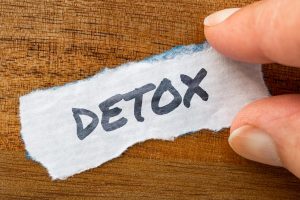Addiction to drugs is a serious illness. It affects both the body and the mind. If you’re suffering from the condition known as substance use disorder, you cannot function normally anymore without taking drugs. Your attitudes and behavior would change drastically, and these changes would severely affect work, school, relationships, and your personal life.
When the drug addiction problems have reached their peak, you may have considered quitting. You may have even tried, but soon enough you find yourself craving for more drugs. Consequently, you may think that it’s impossible to quit.
Thankfully, there is hope. Quitting is possible through a procedure known as drug detox.
Detox, short for detoxification, is a process of ridding your body of all traces of the drugs you have taken. The main purpose of detox is to help you manage those unpleasant withdrawal symptoms you experience when quitting drugs. These withdrawal symptoms are what cause you to crave intensely for more drugs when you try to quit on your own. To help you stay comfortable despite these symptoms, a doctor may prescribe some medications for you.
What are withdrawal symptoms and why do they happen?
 When you take drugs, they cause changes in the chemical makeup in your brain. Specifically, addictive substances upset the balance of neurotransmitters in the brain. Neurotransmitters are responsible for triggering emotions such as happiness, elation, and feelings of reward. Usually, drugs intensify the actions of these brain chemicals, which is why you get euphoric feelings when taking them.
When you take drugs, they cause changes in the chemical makeup in your brain. Specifically, addictive substances upset the balance of neurotransmitters in the brain. Neurotransmitters are responsible for triggering emotions such as happiness, elation, and feelings of reward. Usually, drugs intensify the actions of these brain chemicals, which is why you get euphoric feelings when taking them.
When you decide to quit the drugs, there would be another imbalance in your brain chemistry. The drug molecules that amplify the neurotransmitters’ effects are suddenly gone. In turn, your brain and nervous system will experience a sort of “shock,” leading to withdrawal symptoms.
These are often the opposite of the drug’s effects. For example, let’s say you suffer from alcohol addiction. Alcohol is a depressant, which lowers your mood and makes you less active. If you try to suddenly quit drinking, you may end up restless or anxious. If these feelings are strong enough, they may compel you to drink alcohol again.
There are different kinds of withdrawal symptoms, ranging from unpleasant to fatal. Also, the symptoms you will experience depends on the kind of substance you’ve been taking.
How long does drug detox last?
The length of detox depends on different factors, like what drugs you’ve taken and how long you’ve used them. In some cases, detox only lasts for a few days. In others, it can last for months.
Here are some of the things that affect the length of a detox process:
- Severity of your addiction
- Kind of substance you have used
- How you used the substance (e.g. smoking, snorting, injection, or swallowing pills)
- How long it’s been since your addiction started
- How much of the substance you took at any one time
- Medical conditions
- Genetics
- Family history
- Underlying mental health issues
Can drug detox be done faster?
 Actually, there are such things as rapid and ultra-rapid detox. These procedures are much faster than regular detox, and proponents claim they are as effective in ridding the body of drugs and preventing withdrawal symptoms. Ultra-rapid detox can be completed in as little as a few hours, while rapid detox takes 2 to 3 days. These procedures are a lot more expensive than regular detox as well. Rapid detox, for example, can cost you up to $10,000. And this is an out-of-pocket expense, as it is not covered by many insurance providers.
Actually, there are such things as rapid and ultra-rapid detox. These procedures are much faster than regular detox, and proponents claim they are as effective in ridding the body of drugs and preventing withdrawal symptoms. Ultra-rapid detox can be completed in as little as a few hours, while rapid detox takes 2 to 3 days. These procedures are a lot more expensive than regular detox as well. Rapid detox, for example, can cost you up to $10,000. And this is an out-of-pocket expense, as it is not covered by many insurance providers.
Rapid detox methods often involve sedating you with an anesthetic while giving you medications that replace the addictive drugs in your body. This method was originally intended for those suffering from opioid addictions, but it’s highly risky. For most cases, the benefits do not outweigh the risks. In fact, there is 1 death for every 500 people who go through this procedure.
The consequences of rapid and ultra-rapid detox are:
- Paranoia
- High body temperature
- Vomiting
- Nausea
- Infections
- Aspiration
- Choking
- Heart attack
- In some cases, death
Also, these rapid detoxes are often ineffective. Most people who have gone through them said they continue to experience withdrawal symptoms, but they are less severe. Still, this indicates that rapid detox is unsuccessful in most cases. Thus, it’s not a good idea to risk your life – as well as your money – with these kinds of procedures.
What are the different steps of drug detox?
Different people have different needs for detox. With that, procedures can be tailor-fit for your particular substance addiction. But in general, drug detox follows three key steps.
- Evaluate: Doctors will take a look at your current physical and mental conditions. Often, they’ll perform blood tests to have an idea how much drugs are inside your body. With that information, they will know the types of medications you need and the dosage. Also, doctors will take your medical history to help them plan your treatment.
- Stabilize: In this step, doctors will give you medical and psychological therapies to make sure you’re fine. Once you’re stable, any form of harm is less likely to come to you. Also, during this step, doctors may give you additional medications to reduce withdrawal symptoms and other complications.
- Prepare for treatment: After detox, you will then go through the next steps of a treatment program. Doctors will orient you on the different parts of the program and how they will help you. You may have to stay in a rehab center for months, too, if you’re enrolled in an inpatient rehab program.
Does drug detox have side effects?
Yes, it does. But with medical supervision, you can be safe and comfortable during the entire detox process.
There are a few side effects you may not be able to avoid, though. These include:
 Insomnia
Insomnia- Nausea
- Nervousness
- Body discomfort
- Mood swings
- Poor sleep quality
- Difficulty concentrating
What will happen after I complete my drug detox?
Detox is just the first part of treating your addiction. The next steps involve psychotherapies, counseling, support groups, and other therapies meant to address the psychological effects of the addiction.
You may have a long way to go, but it will all be worth it once you reach your goal of living a sober life.
